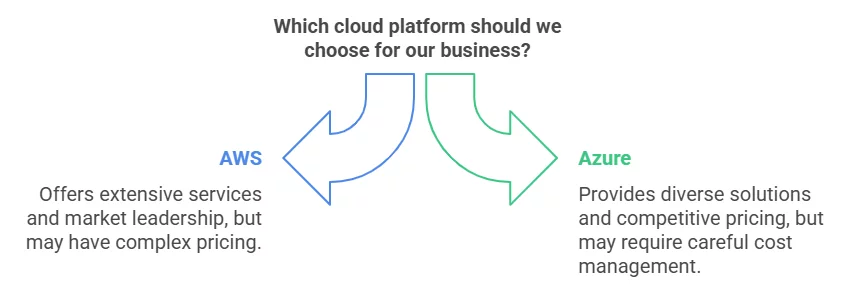In 2025, cloud computing is advancing rapidly as businesses prioritize digital transformation, scalability, and efficiency. Microsoft Azure and Amazon Web Services (AWS) have established themselves as key players, offering essential infrastructure to support startups, enterprises, and public sector organizations globally. Choosing between Azure vs AWS is more than a technical decision as it directly impacts cost, performance, and business continuity. Both platforms offer a variety of features, services, and tools for different industries, but their subtle differences can determine the success of your cloud initiatives.
In this article, we will discuss the key differences between AWS and Azure, their use cases, pricing & cost efficiency, data center availability, and more.
What Makes Comparing Azure vs AWS important?
The AWS vs Azure comparison remains crucial for several reasons:
Market Leadership: The cloud computing market is expected to reach $2,291.59 billion by 2032, according to Fortune Business Insight report. Together, AWS and Azure dominate over 60% of the global cloud market, making them the most trusted platforms for critical applications, data storage, and infrastructure. Their ongoing competition drives innovation, providing businesses with advanced tools and solutions.
Extensive Offerings: Both platforms offer a vast ecosystem that includes:
-
- Compute resources (virtual machines and containers)
- Storage solutions (Object, File, and Block Storage)
- Databases (relational and NoSQL)
- AI/ML capabilities
- Networking and security tools
With such diverse options, businesses need clarity to choose the platform that aligns with their workloads and growth strategies.
As cloud adoption continues to expand in 2025, companies must optimize costs while maintaining scalability and performance. AWS and Azure differ in pricing structures, discount plans, and available tools, making it challenging to determine which offers the best return on investment.
A thorough comparison helps businesses select the right platform that meets their needs efficiently without unnecessary spending or added complexity.

Key Differences Between Azure vs AWS
The table below highlights the key differences between AWS vs Azure, helping you choose the best cloud solution for your needs.
| Category | Azure | AWS |
|---|---|---|
| Compute | Azure Virtual Machines: Flexible cloud-based servers designed to handle various workloads. | Amazon EC2: Adaptable virtual servers designed for expandable computing power. |
| Azure Functions: Serverless computing service for developing and executing lightweight, event-driven applications. | AWS Lambda: Serverless computing service designed to run event-driven applications. | |
| Storage | Azure Blob Storage: Extensively scalable object storage solution for managing unstructured data. | Amazon S3: Flexible object storage solution designed for data backup and archiving. |
| Azure Files: Cloud-based file storage with built-in SMB protocol support. | Amazon EFS: Scalable file storage service optimized for Linux-based workloads. | |
| Database | Azure SQL Database: Managed relational database service enhanced with AI-driven optimization. | Amazon RDS: Managed relational database service supporting MySQL, PostgreSQL, and other databases. |
| Azure Cosmos DB: Globally distributed NoSQL database offering low-latency performance. | DynamoDB: High-performance NoSQL database service designed for scalability and efficiency. | |
| AI & ML | Azure AI: An all-in-one AI service providing tools for bots, data analysis, and speech recognition. | Amazon SageMaker: Develop, train, and deploy machine learning models efficiently. |
| Cognitive Services: Ready-to-use APIs for vision, speech, language processing, and decision-making. | Amazon Lex: Create conversational interfaces with voice and text capabilities. | |
| Networking | Azure Virtual Network (VNet): Securely isolates and manages network resources. | Amazon VPC: Securely isolates cloud resources for optimized networking. |
| Traffic Manager: Distributes traffic and balances loads for global applications. | Route 53: Domain name system (DNS) and domain management service. | |
| Security | Azure Active Directory (AAD): Access control and identity management solution. | AWS IAM: User permission management through identity and access control. |
| Azure Sentinel: Cloud-based SIEM solution for threat detection and incident response. | GuardDuty: Continuous monitoring and threat detection service. |
Azure vs Aws: Data Center Availability
Global data center presence is essential for low latency, high availability, and disaster recovery.
- Azure: Azure leads with 60+ cloud regions, providing the broadest coverage, making it ideal for businesses needing local access and regulatory compliance.
- AWS: With 30+ regions and 99+ Availability Zones, AWS offers strong global scalability and continues expanding to meet growing demand.
For organizations prioritizing extensive global reach, Azure stands out, while AWS ensures reliable performance across its established regions.
Azure vs Aws: Pricing and Cost Efficiency
Both AWS and Azure follow a pay-as-you-go pricing model, allowing users to pay only for what they consume. However, their cost-saving strategies and pricing structures differ.
Azure: More economical for organizations leveraging Microsoft ecosystems, with benefits like:
-
- Hybrid Benefits: Discounts for reusing Windows Server or SQL Server licenses.
- Pricing Transparency: Built-in tools to estimate and optimize costs efficiently.
AWS: Known for its flexible pricing, AWS provides various cost-saving options such as:
-
- Reserved Instances (RIs): Prepaid instances with substantial discounts.
- Spot Instances: Suitable for flexible workloads, with savings of up to 90%.
Azure vs AWS Use Cases
Azure and AWS cater to different business needs, offering solutions for AI, enterprise applications, and hybrid cloud environments. The table below outlines their key use cases.
| Azure is Best for | AWS is Best for |
|---|---|
| Hybrid Cloud Solutions: Ideal for businesses requiring smooth integration with on-premises systems. | Global Reach: Ideal for enterprises that need a reliable infrastructure to support worldwide operations. |
| Microsoft Ecosystem: Ideal for companies utilizing Windows Server, Office 365, or SQL Server. | Cutting-Edge AI/ML Initiatives: Businesses utilizing machine learning platforms such as SageMaker. |
| Compliance-Focused Sectors: Industries that must meet stringent regional regulatory requirements. | Scalable Computing and Storage: Companies requiring adaptable resources based on demand. |
Final Thoughts
From above comparison of Azure vs AWS, we get that while AWS offers a robust and reliable cloud infrastructure, Azure stands out with its hybrid cloud capabilities, seamless Microsoft integration, and advanced security solutions, making it ideal for enterprises with diverse IT needs. Azure’s AI-powered analytics and automated compliance tools make it a strong choice for businesses prioritizing security, governance, and seamless connectivity across environments.
For organizations looking for an intelligent, future-ready cloud platform, Azure offers a distinct edge. If you’re considering migrating to Azure, Intelegain provides expert Azure cloud migration services to ensure a smooth and efficient transition. Feel free to connect with us for FREE consultation!
Frequently Asked Questions
Azure leads in hybrid cloud solutions with services like Azure Arc and seamless integration with on-premises infrastructure. AWS also offers hybrid options, but Azure is often preferred for businesses using Microsoft environments.
Yes, many businesses adopt a multi-cloud approach, leveraging AWS for certain workloads and Azure for others. This strategy provides flexibility and prevents vendor lock-in.
Azure provides built-in disaster recovery solutions like Azure Site Recovery, ensuring business continuity with minimal downtime. AWS also offers disaster recovery options, but Azure's native integration with Microsoft services gives it an edge for enterprises relying on Windows-based environments.
Azure offers AI and analytics services like Azure Synapse Analytics and Azure Machine Learning. AWS provides services like Redshift and SageMaker. The best choice depends on your organization's data and AI strategy.










